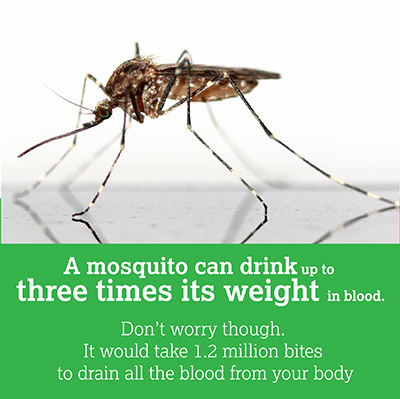There are thousands of species of mosquitoes on the planet
Only about 150 of those species are within the US and about 59 can call Maryland their home. Breeds of mosquitoes vary around Maryland and not all of the species can be found in one place. The mosquitoes from the eastern shore are very different from what can be found in Howard County, Maryland due to the habitats in which they breed.
Mosquito Breeding
It’s a common misconception that mosquitos breed in streams, ponds and lakes. Mosquitoes cannot breed successfully in flowing water. Mosquitoes need dry, shallow, stagnant puddles in a stream bed to breed. In Maryland, most breeding occurs in woodlands and adjacent swamps. However, any and all low lying water sources can be a breeding ground.
Maryland experienced one of the coldest winters on record. The extreme winter weather, heavy snowfalls and frigid arctic air will have an effect on the mosquito population into the summer. As the snow melted into a delayed spring, many areas of standing water have served as mosquito breeding ground that will increase our summer populations and swarms. Any kind of temporary body of water that is present for more than a week can become a breeding habitat. Mosquitos in more suburban/urban areas may lay eggs in ornamental ponds, rain gutters, birdbaths, rain collection barrels, and other surfaces capable of holding water.
How Mosquitoes Feed
Both male and female mosquitoes feed on nectar and plant juices. The female mosquito mouthparts are adapted to pierce the skin of animals and humans, sucking their blood. Female mosquitoes use their mouth parts to puncture the skin and inject saliva to prevent the blood from clotting. The protein and iron rich blood, combined with the carbohydrates received from the plant nectar are used by the female to help the development of her eggs. Female mosquitoes can lay up to 300 eggs at a time. The discomfort, swelling and irritation from a mosquito bite are a result of the body’s immune system reacting to the saliva.
Mosquito Life Cycle
Mosquitoes spend their first 10 days in water. Water is necessary for the eggs to hatch into larvae. The larvae will feed on organic matter that is stagnant in the shallow water, breathing oxygen from the surface. Once the larvae is developed it will no longer feed and molt into a pupae. An adult mosquito will emerge from a pupae. The average mosquito lifespan is less than two months. Males have the shortest lives, usually 10 days or less.
Anatomy and Behavior
Mosquitoes have six legs, a head, thorax and abdomen. They have two, large compound eyes, two simple eyes and two antennae. Using the receptors on their antennae, mosquitos can track a human source by detecting the carbon dioxide released when we exhale. Sweat also helps mosquitoes choose their victims. They are fond of the more than 340 chemical odors the human body releases in sweat. The odor smells like dinner to them.

Prevention and Treatment
Ways you can help eliminate mosquito breeding grounds:
- Dispose of old tires, buckets, ceramic pots, bird baths and other containers in your yard that may collect water.
- Dump standing water from containers, including bird feeders, on your property.
- Clean clogged roof gutters. Flooded roof gutters are easily overlooked but can produce hundreds of mosquitoes each season.
- Turn over plastic wading pools when not in use.
- Turn over wheelbarrows when not in use.
- Stock ornamental gardens with mosquito-eating fish such as goldfish and guppies.
- Clean and chlorinate swimming pools that are not being used. A swimming pool that is left for a month can produce enough mosquitoes to infest an entire neighborhood. Be aware that mosquitoes may also breed in the water that collects on swimming pool covers.
- Keep drains, ditches and culverts free of grass clippings, weeds and trash so water will drain properly.
What to do if I see them
As our weather continues to warm, you will be seeing mosquitoes start to swarm. We can help you take control of mosquitoes by making a detailed inspection of your property. We’ll create a customized mosquito control solution to help resolve the problem quickly. Let us put our knowledge of entomology and our years of experience in the Howard County area to work for you.


